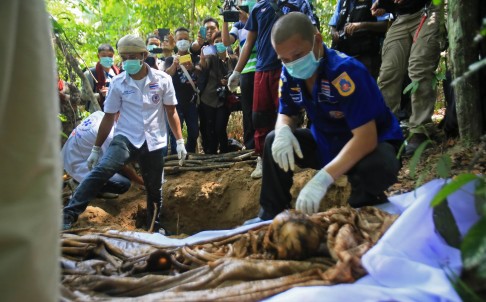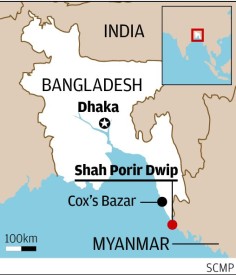Crackdown turns Bangladesh smuggling hub into deserted island
Locals have fled Bangladesh island to avoid raids by security forces that were sparked by recent discovery of mass graves in Thailand
PUBLISHED : Monday, 18 May, 2015, 3:29am
UPDATED : Monday, 18 May, 2015, 3:32am
Agence France-Presse in Shah Porir Dwip, Bangladesh

Rescue workers retrieve human remains from graves near the hillside site where shallow graves containing 26 bodies were found on May 1, close to the town of Padang Besar in the southern Thai province of Songkhla. Photo: AFP
Fringed with coconut trees and sandy beaches, Bangladesh's near-deserted island of Shah Porir Dwip feels more like a sleepy fishing port than a launch pad for a multimillion-dollar people smuggling industry.

But while the shores are still lined with wooden fishing boats, the crews are nowhere to be seen and the nets have seen little action of late.
"They all used to be boatmen or fishermen, but gradually they realised how lucrative human trafficking is, so they became middlemen or traffickers themselves," said local police officer Kabir Hossain on a tour of the island, the rolling hills of neighbouring Myanmar visible on the horizon. "More than 60 per cent of the people living here are now either directly or indirectly involved with trafficking."
Activists estimate up to 8,000 migrants may now be at sea in Southeast Asia.
Most of them are ethnic Rohingya, heading south from Bangladesh or Myanmar to wealthier countries such as Malaysia.
But growing numbers of Bangladeshis are also trying to make the trip, forking out up to US$3,000 for a place on rickety and overcrowded trawlers that often fail to reach their destination. In doing so, they are fuelling a trade that offers riches far outweighing the money that can be legally earned from fishing.
Hossain was one of the few men on the streets, locals having fled in droves to avoid raids by security forces sparked by the recent discovery in Thailand of mass graves containing the remains of migrants from Bangladesh and Myanmar.
More than 90 suspected human smugglers were arrested from Shah Porir Dwip and an adjoining village during the raids, and they are now being held on remand. Three alleged smuggling kingpins were also shot dead during the crackdown, all of them from Shah Porir Dwip.
Normally home to about 12,000 people, the island has become something of a ghost town since the elite Rapid Action Battalion set up a checkpoint on the island and other agencies raided homes.
Police and other observers have identified scores of launch pads from where the migrants begin their journey, all in the Cox's Bazar district of southern Bangladesh that borders Myanmar. While only about a dozen migrants get into the initial fishing boats, the larger vessels that then head towards Southeast Asia are usually jam-packed with hundreds on board.
A UN official based in Cox's Bazar said the smuggling trade took off in 2001 when the first Rohingya attempted to reach Thailand and Malaysia by sea. Bangladeshis, wanting a better life, started making the same journey about five years later.
"It's become one of the most profitable of all forms of organised crime," said the official.
While Bangladeshi police don't have figures on the number of sailings, their record of arrests point to the scale of the recent increase. While only 132 people were arrested in 2012 as they tried to travel illegally to Malaysia, that figure jumped to 1,550 in 2014.
The alleged kingpins who were shot dead included Dholu Hossain, whom police say smuggled more than 1,000 refugees.
Despite the newfound push to combat people smuggling, the authorities face an uphill task.
"There are around 9,000 fishing vessels plying the seas off Cox's Bazar, mostly unlicensed. It's very hard for the authorities to trace them once they are out at sea," the UN official said.
"If a crime such as people-trafficking can't be detected and halted on land then the chances of it being prevented out at sea are even less."
